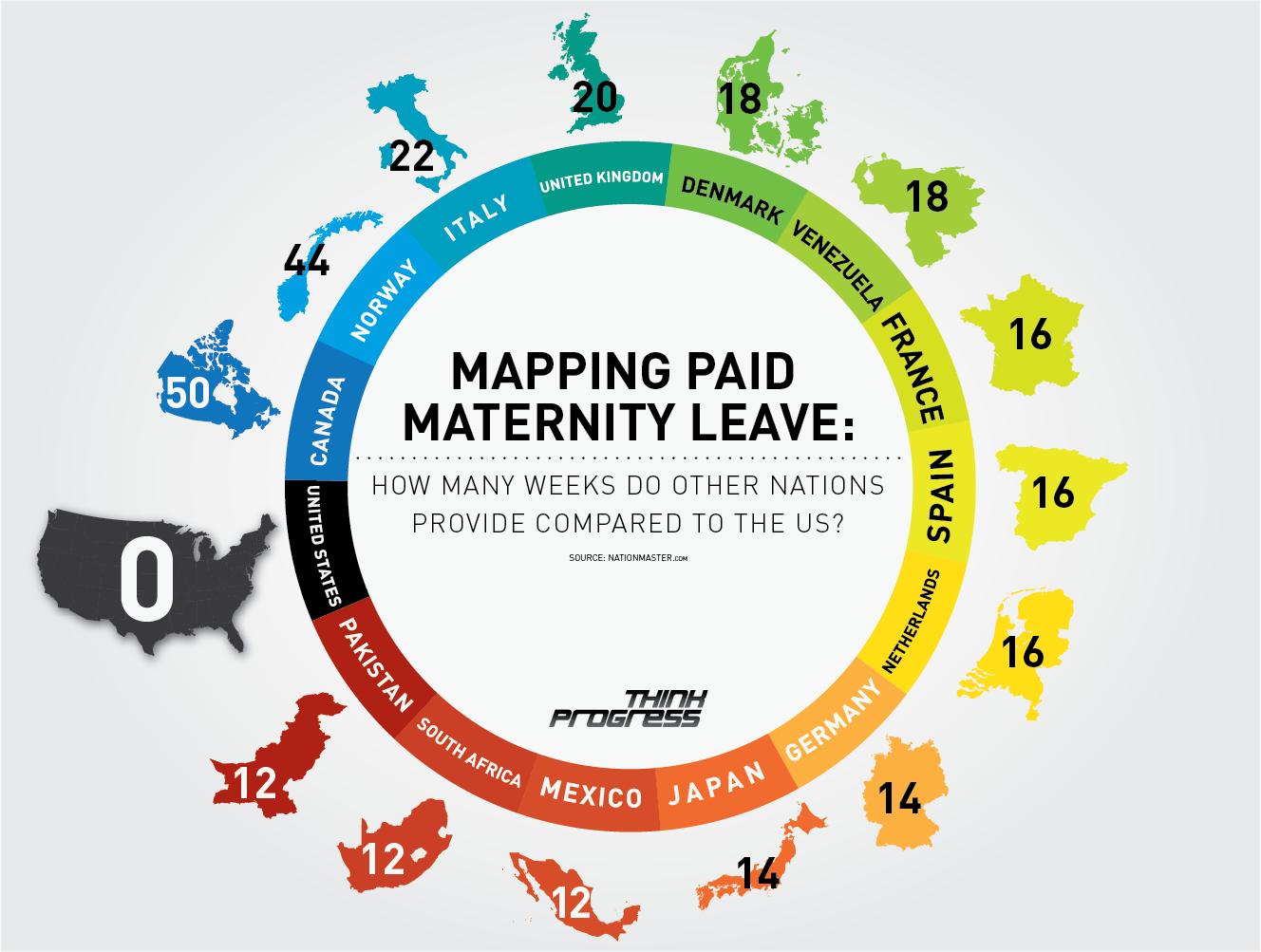Most people in the US probably don’t realize this but the United States is behind every other developed nation with regard to paid-time-off. Your average American probably thinks that getting paid to take time off is just for the elite. But this is far from the truth in some parts of the world. Every other developed nation offers some benefits to postpartum mothers, and many of them offer quite a bit.
As President Obama recently told an audience in June at the White House Summit on Working Families: “There is only one developed country in the world that does not offer paid maternity leave, and that is us. And that is not the list you want to be on by your lonesome.”
In addition to the President’s support there are many advocates that are trying to change our leave policy in the United States. The nation is seeing a city-by-city grass roots movement to change sick leave policies. And there are a couple of US Senators advocating to expand the Family and Medical Leave Act, called the FAMILY Act so that more people would qualify for the benefits.
The debate is heated on both sides. Advocates for change contend that the lack of PTO for sick and maternity leave essentially boils down to a women’s rights issue. While the opposition maintains that offering paid time off hurts small businesses and stifles job creation. There hasn’t been much evidence offered up to support those claims but the fact that not offering maternity leave and sick time hurts women more than it hurts men is obvious: Women must take time off from work to give birth, heal from labor, and bond with new babies. Men do not need to do this (although, it’s ideal for men to take some time off to bond as well). And women are almost always the ones responsible for taking time off when the kids get sick. Currently, they have to do this unpaid. This can be absolutely detrimental for single mothers.
Americanprogress.org put together an infographic describing how our lack of benefits hurts women and families. They said that, “New moms who don’t have access to paid leave are less likely to be working 9 to 12 months after giving birth.” Once they take unpaid time off from work, they find it hard to return to the workforce at all. Many mothers who take unpaid leave end up having to borrow money, put off paying bills, or go on public assistance. Making late payments can affect one’s credit score, which makes it harder and more expensive to get a car or home loan.
If the fact that every other developed nation offers paid leave doesn’t itself prove that we’re doing something wrong here, then let’s take a look at the alternatives:
- Remove women from the workforce entirely so that they can take care of sick children and have babies without disrupting business operations.
Problem: Women would once again be dependent upon men and be unable to care for themselves or their children in case of divorce, abuse, or disaster. - Tell women to quit having children.
Problem: There would be no human race in 100 years. - Encourage working women to have children early.
Problem: Women go to college, to graduate school, and get a start on their careers at the exact same time that men do. They’re not thinking about families much earlier than men are these days. - Realize that we are a part of a community and that while women may be the main caretakers of the children, everyone benefits from it and should support it and not penalize it.
Problem: It will take some getting used.
- Remove women from the workforce entirely so that they can take care of sick children and have babies without disrupting business operations.
While small businesses will find themselves with a new expense if offering paid sick time became a law, it would be good for the society as a whole and the well being of our people. As for the maternity leave, that is something that would be paid for by the people. Businesses would only suffer in that they would have to temporarily replace their worker during her absence. The FAMILY Act proposes to essentially tax the people to pay for the benefit. The cost is really quite low at just 2 cents for every $10 made. This amounts to a measly $2 on average per bi-weekly paycheck to support the women and children of this country.
Instead of seeing women as a drain on a company’s resources, business owners should see their workforce as a total expense, i.e. what the men cost and what the women cost is the total cost. If the two were not considered separately, as they are now, we may not have the biases that we have against women workers. In fact, in countries where paid leave is the norm – which is all other developed nations except for ours – these biases are not as strong. Social science studies have shown that it is the cultural attitudes that shape our tolerance to family-related paid time off.
There are thousands of companies and bosses who are already tolerant towards the needs of families but the country as a whole is generally not. Ultimately, it is the children that are hurt by our callous views on work and family. Children all over the nation (and that means your kid’s friends!) are affected by our choices on this matter.






One Response